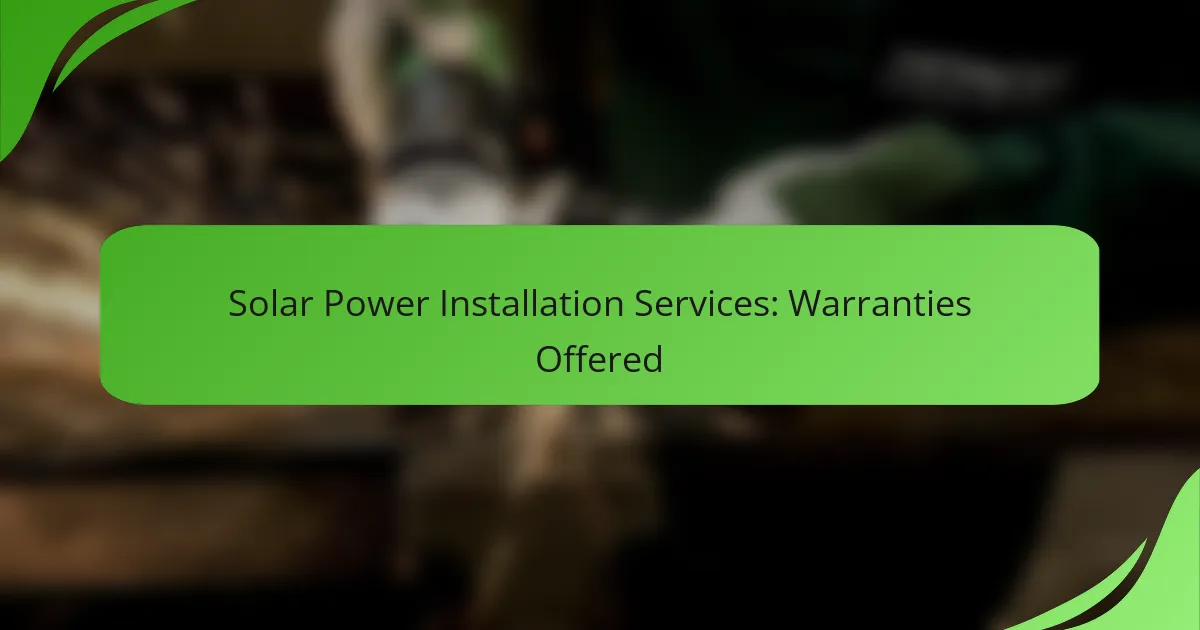When considering solar power installation services, it’s essential to understand the various warranties available to protect your investment. In California, these warranties typically encompass manufacturer guarantees for solar panels, installation warranties from contractors, and performance assurances that confirm energy production levels. By grasping the specifics of these warranties, homeowners can safeguard against defects and unexpected repair costs, ensuring a reliable solar energy system.
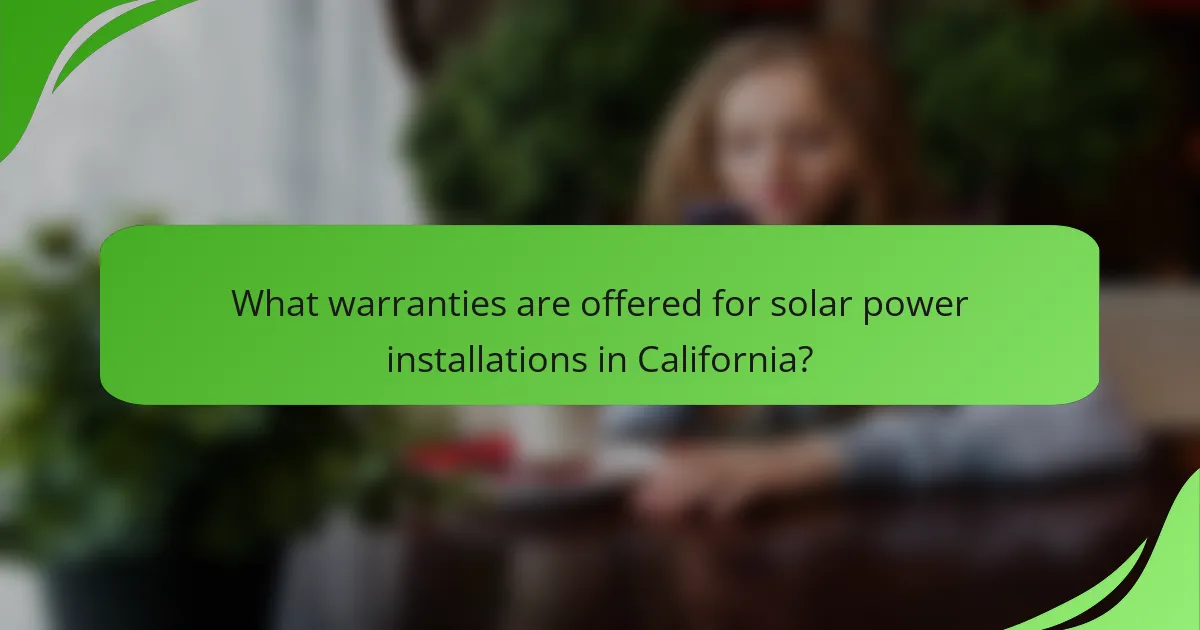
What warranties are offered for solar power installations in California?
In California, solar power installations typically come with several warranties that protect homeowners against defects and performance issues. These warranties generally include manufacturer warranties for the solar panels, installation warranties from the contractors, and performance guarantees that ensure the system meets specified energy production levels.
Manufacturer warranties
Manufacturer warranties for solar panels usually cover defects in materials and workmanship. Most solar panels come with warranties ranging from 10 to 25 years, with many manufacturers offering a performance guarantee that ensures panels will produce a certain percentage of their rated output over time.
When selecting solar panels, check the specific warranty details, as some manufacturers may offer better coverage or longer terms. It’s also wise to consider the manufacturer’s reputation and financial stability, as this can affect warranty fulfillment.
Installation warranties
Installation warranties are provided by the solar installation company and typically cover the workmanship associated with the installation. These warranties can range from 1 to 10 years, depending on the contractor and the complexity of the installation.
It’s crucial to review the installation warranty terms carefully, as they may specify what types of issues are covered and the process for making a claim. Choosing a reputable installer with a strong warranty can provide peace of mind and protect your investment.
Performance guarantees
Performance guarantees ensure that your solar power system will generate a certain amount of electricity over a specified period. These guarantees are often tied to the size of the system and the expected sunlight in your area, typically promising a certain percentage of the rated output.
When evaluating performance guarantees, consider the terms and conditions, such as the duration of the guarantee and the penalties for underperformance. This can help you understand the reliability of your solar investment and what recourse you have if the system does not meet expectations.
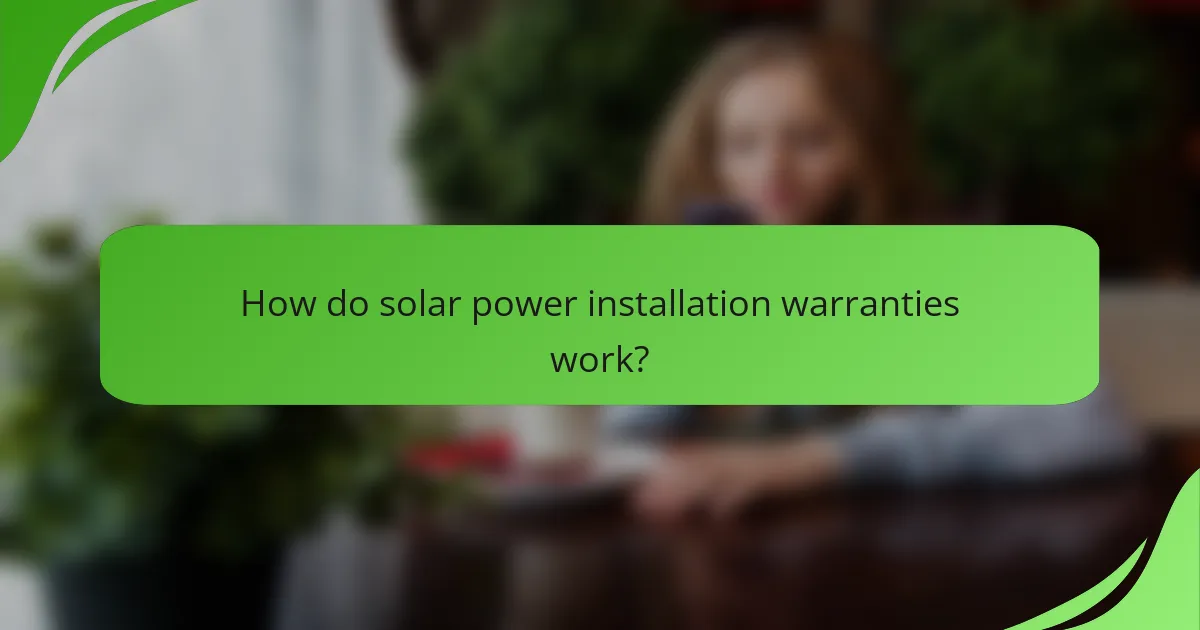
How do solar power installation warranties work?
Solar power installation warranties provide protection for both the equipment and the workmanship involved in the installation process. These warranties typically cover defects and failures, ensuring that homeowners are safeguarded against unexpected repair costs.
Coverage duration
The coverage duration of solar power installation warranties can vary significantly. Equipment warranties often last between 10 to 25 years, while workmanship warranties may range from 1 to 10 years. It’s essential to check the specific terms offered by your installer to understand the duration of coverage for both components.
Longer coverage periods can offer peace of mind, but they may also come with higher installation costs. Assess your budget and the reliability of the installer when considering warranty duration.
Claim process
The claim process for solar power installation warranties typically involves several steps. First, homeowners should document any issues with the system, including photographs and descriptions of the problem. Next, contact the installer or warranty provider to report the issue and initiate the claim.
Be prepared to provide evidence of the problem and follow any specific instructions given by the warranty provider. Timely reporting and thorough documentation can help expedite the claim process, ensuring that repairs or replacements are handled efficiently.
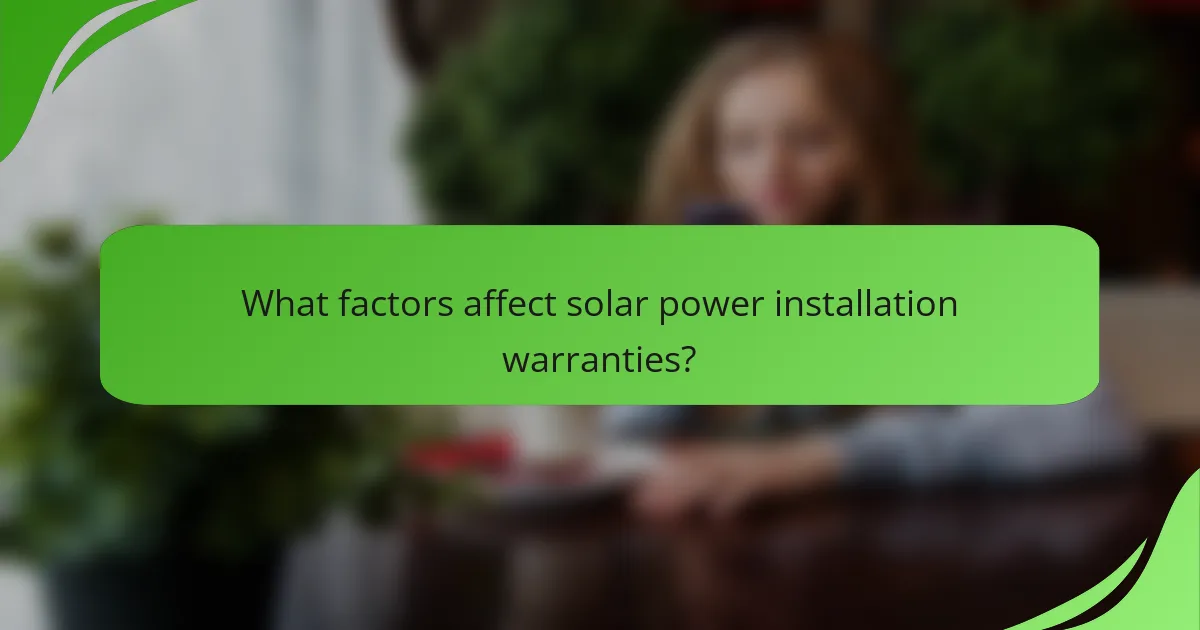
What factors affect solar power installation warranties?
Several factors influence the warranties offered for solar power installations, including the type of solar panels used and the reputation of the installation company. Understanding these elements can help consumers make informed decisions about their solar investments.
Type of solar panels
The type of solar panels plays a significant role in determining warranty coverage. Typically, manufacturers offer warranties ranging from 10 to 25 years, depending on the panel type. Higher-end panels, such as monocrystalline, often come with longer warranties due to their efficiency and durability.
When selecting solar panels, consider both performance and product warranties. Performance warranties guarantee a certain level of energy production over time, while product warranties cover defects and failures. It’s wise to choose panels with robust warranties to ensure long-term reliability.
Installation company reputation
The reputation of the installation company can greatly affect the warranties they provide. Established companies with a strong track record are more likely to offer comprehensive warranties, as they have confidence in their workmanship and the products they use. Researching customer reviews and industry ratings can provide insights into a company’s reliability.
Additionally, some companies may offer their own warranties that extend beyond manufacturer coverage. These can include labor warranties or performance guarantees. Always read the fine print and ask about warranty terms before making a commitment to ensure you are fully protected.
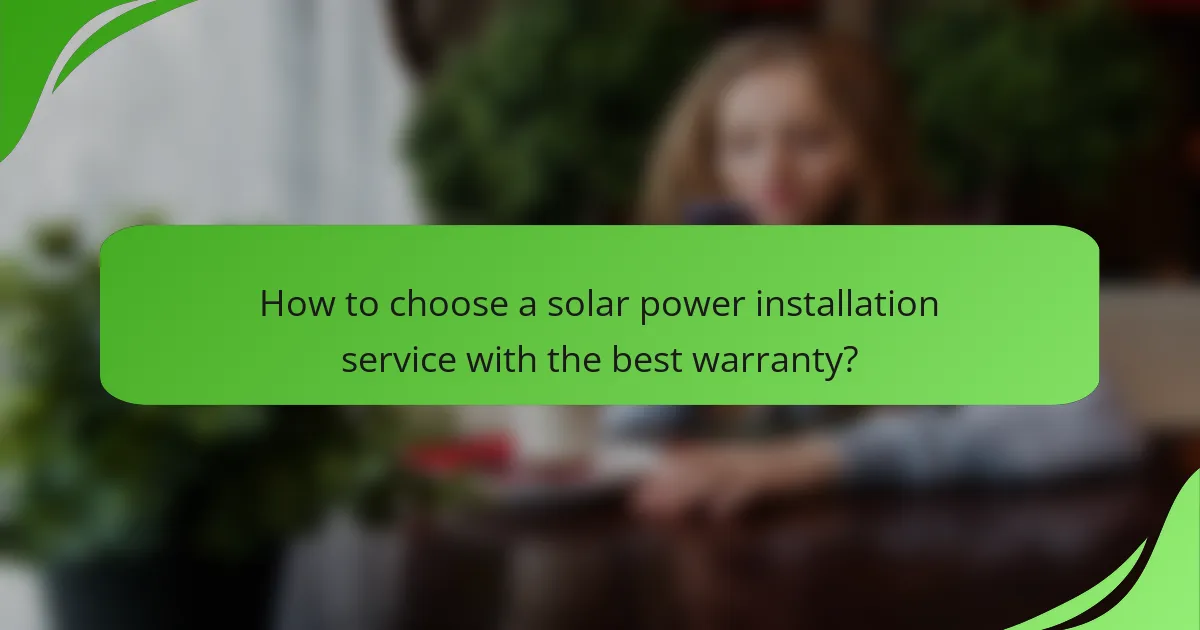
How to choose a solar power installation service with the best warranty?
To choose a solar power installation service with the best warranty, focus on understanding the coverage, duration, and conditions of the warranty offered. A strong warranty can protect your investment and ensure long-term performance of your solar system.
Compare warranty terms
When comparing warranty terms, look for coverage on both equipment and labor. Equipment warranties typically last between 10 to 25 years, while labor warranties may range from 1 to 10 years. Ensure you understand what is included, such as parts replacement, system performance guarantees, and any exclusions.
Some companies offer tiered warranties that provide different levels of coverage based on the system’s price or components used. It’s crucial to read the fine print to identify any conditions that could void the warranty, such as improper maintenance or modifications.
Read customer reviews
Customer reviews can provide insight into the reliability of a solar power installation service and the effectiveness of their warranty. Look for feedback specifically mentioning warranty claims, response times, and customer service experiences. This information can highlight how well a company stands behind its products.
Check multiple review platforms and consider both positive and negative feedback. A pattern of complaints regarding warranty issues may indicate potential problems, while consistent praise can signal a trustworthy service provider. Aim for companies with a solid reputation and a history of honoring their warranties.
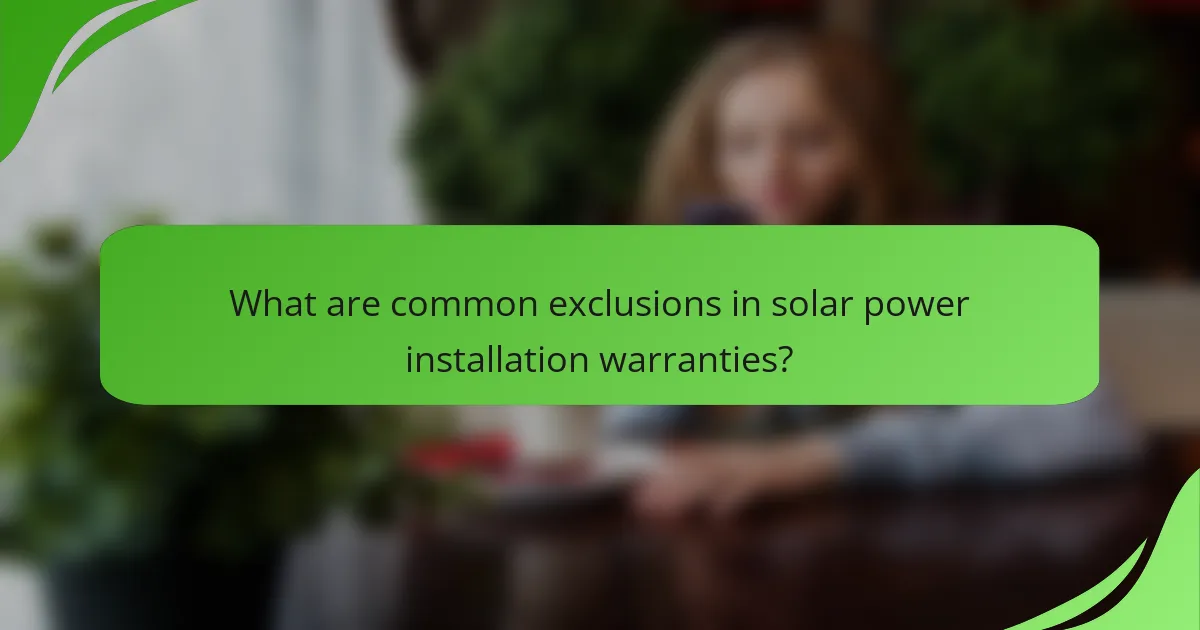
What are common exclusions in solar power installation warranties?
Common exclusions in solar power installation warranties often include damages caused by natural disasters and improper maintenance. Understanding these exclusions can help homeowners avoid unexpected costs and ensure their solar systems remain protected under warranty.
Natural disasters
Warranties typically do not cover damages resulting from natural disasters such as hurricanes, earthquakes, or floods. These events can cause significant harm to solar panels and associated equipment, leading to costly repairs that fall outside warranty protection.
Homeowners should consider purchasing additional insurance to cover potential damages from such disasters. Reviewing local weather patterns and historical data can also help assess the risk of natural disasters in your area.
Improper maintenance
Improper maintenance is another common exclusion in solar power installation warranties. If a system is not regularly cleaned or maintained according to manufacturer guidelines, any resulting damage may not be covered. This includes neglecting to remove debris or failing to address minor issues promptly.
To avoid warranty voiding, homeowners should follow recommended maintenance schedules and keep records of all service performed. Regular inspections by qualified professionals can also help ensure compliance with warranty requirements and prolong the lifespan of the solar system.
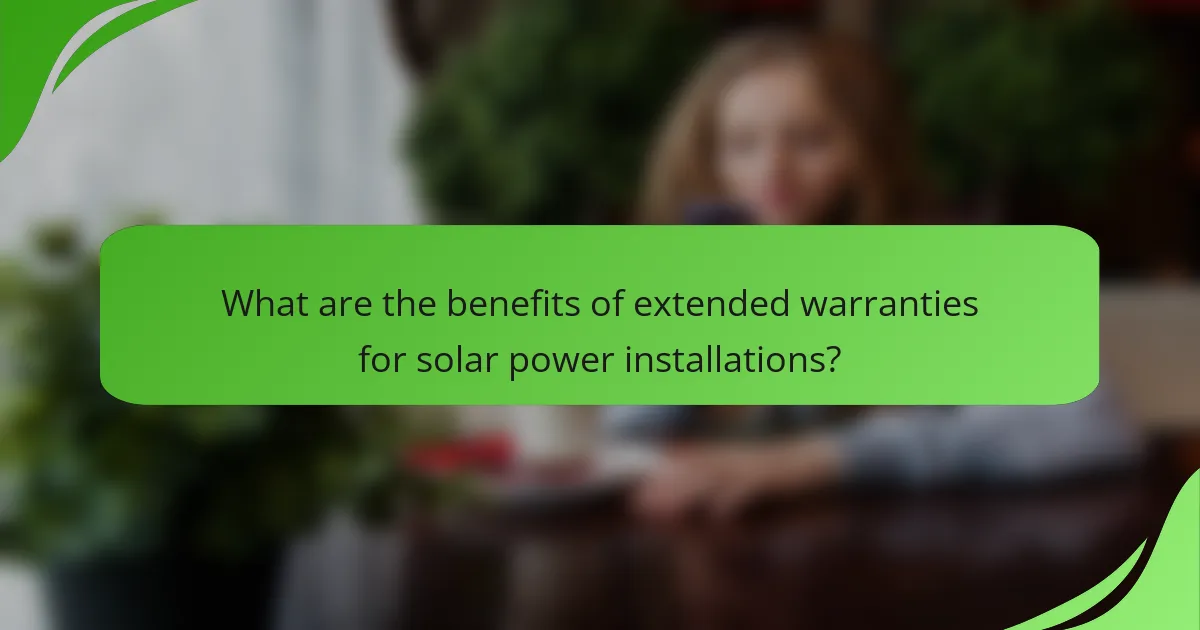
What are the benefits of extended warranties for solar power installations?
Extended warranties for solar power installations provide crucial long-term protection and peace of mind. They cover potential repairs and replacements, ensuring that your investment remains functional and efficient over time.
Long-term protection
Extended warranties offer long-term protection against unexpected failures and malfunctions of solar equipment. Typically lasting 20 to 25 years, these warranties can cover components such as inverters and panels, which may require costly repairs as they age.
When considering an extended warranty, evaluate what is included in the coverage. Look for policies that cover both parts and labor, as this can significantly reduce out-of-pocket expenses in case of issues.
Increased property value
Having an extended warranty can enhance the resale value of your property. Potential buyers often view a warranty as a sign of reliability, which can make your home more attractive in a competitive market.
In some cases, homes with solar installations and accompanying warranties can sell for 5-10% more than similar homes without these features. This added value can be a compelling reason to invest in an extended warranty when installing solar power systems.
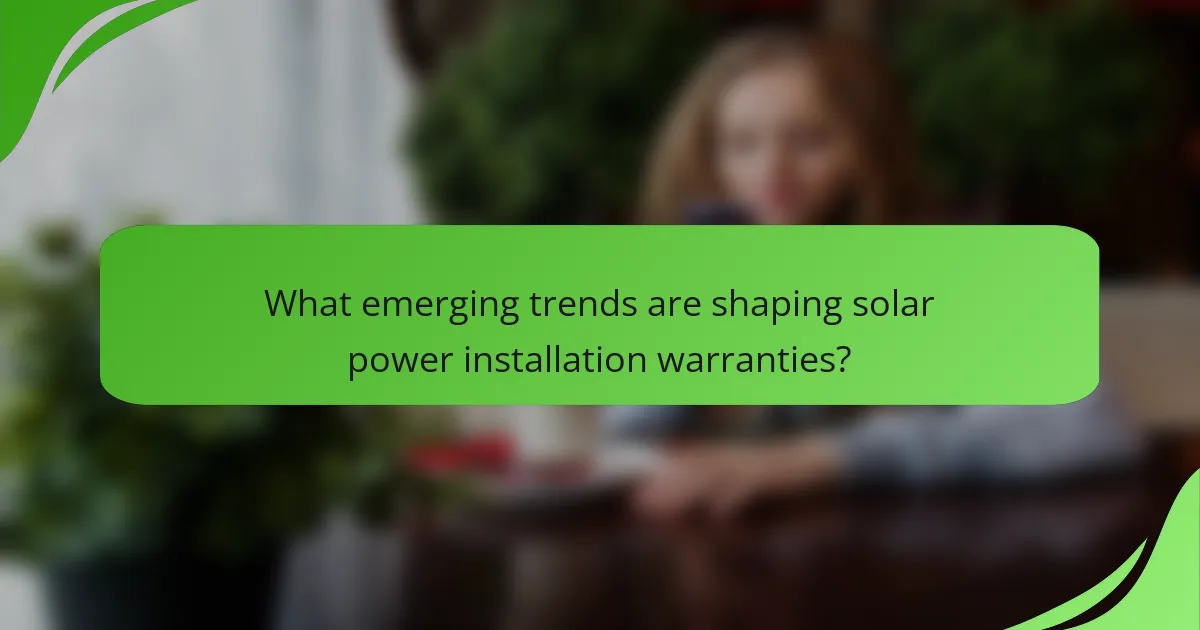
What emerging trends are shaping solar power installation warranties?
Emerging trends in solar power installation warranties focus on enhancing customer confidence and ensuring long-term performance. As the solar market evolves, warranties are becoming more comprehensive, addressing both product reliability and energy production guarantees.
Performance-based warranties
Performance-based warranties guarantee a certain level of energy output over a specified period, typically ranging from 25 to 30 years. These warranties ensure that the solar panels will produce a minimum percentage of their rated capacity, often around 80-90% by the end of the warranty period.
When considering performance-based warranties, it’s crucial to understand the terms and conditions. Some warranties may include provisions for regular maintenance or monitoring to ensure optimal performance. Customers should also check if the warranty covers degradation rates, which can vary significantly between manufacturers.
To avoid pitfalls, always read the fine print. Look for warranties that clearly outline the performance metrics and any penalties for underperformance. It’s advisable to compare different manufacturers and their warranty offerings to find the best fit for your solar investment.
